TED演讲
- 格式:doc
- 大小:74.50 KB
- 文档页数:8
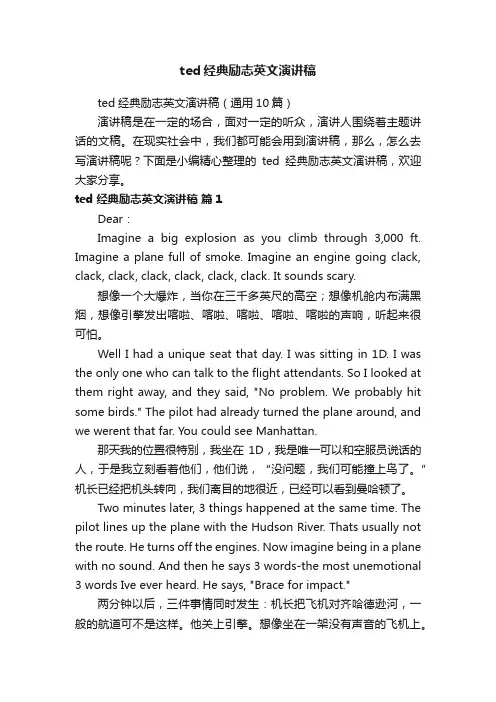
ted经典励志英文演讲稿ted经典励志英文演讲稿(通用10篇)演讲稿是在一定的场合,面对一定的听众,演讲人围绕着主题讲话的文稿。
在现实社会中,我们都可能会用到演讲稿,那么,怎么去写演讲稿呢?下面是小编精心整理的ted经典励志英文演讲稿,欢迎大家分享。
ted经典励志英文演讲稿篇1Dear:Imagine a big explosion as you climb through 3,000 ft. Imagine a plane full of smoke. Imagine an engine going clack, clack, clack, clack, clack, clack, clack. It sounds scary.想像一个大爆炸,当你在三千多英尺的高空;想像机舱内布满黑烟,想像引擎发出喀啦、喀啦、喀啦、喀啦、喀啦的声响,听起来很可怕。
Well I had a unique seat that day. I was sitting in 1D. I was the only one who can talk to the flight attendants. So I looked at them right away, and they said, "No problem. We probably hit some birds." The pilot had already turned the plane around, and we werent that far. You could see Manhattan.那天我的位置很特別,我坐在1D,我是唯一可以和空服员说话的人,于是我立刻看着他们,他们说,“没问题,我们可能撞上鸟了。
” 机长已经把机头转向,我们离目的地很近,已经可以看到曼哈顿了。
Two minutes later, 3 things happened at the same time. The pilot lines up the plane with the Hudson River. Thats usually not the route. He turns off the engines. Now imagine being in a plane with no sound. And then he says 3 words-the most unemotional 3 words Ive ever heard. He says, "Brace for impact."两分钟以后,三件事情同时发生:机长把飞机对齐哈德逊河,一般的航道可不是这样。
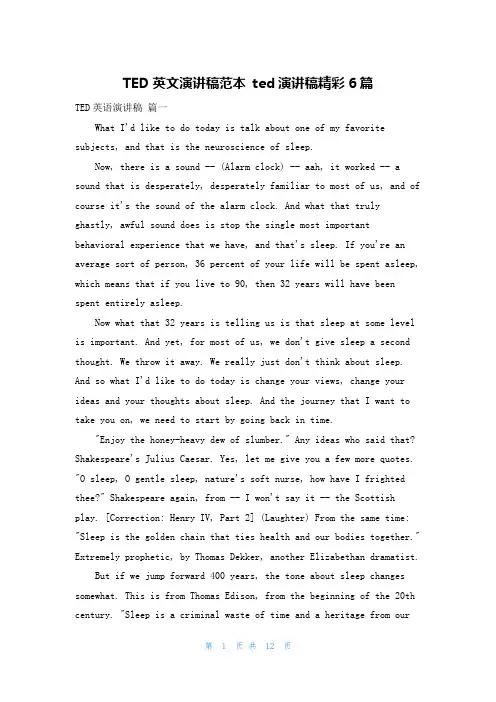
TED英文演讲稿范本ted演讲稿精彩6篇TED英语演讲稿篇一What I'd like to do today is talk about one of my favorite subjects, and that is the neuroscience of sleep.Now, there is a sound -- (Alarm clock) -- aah, it worked -- a sound that is desperately, desperately familiar to most of us, and of course it's the sound of the alarm clock. And what that truly ghastly, awful sound does is stop the single most importantbehavioral experience that we have, and that's sleep. If you're an average sort of person, 36 percent of your life will be spent asleep, which means that if you live to 90, then 32 years will have beenspent entirely asleep.Now what that 32 years is telling us is that sleep at some levelis important. And yet, for most of us, we don't give sleep a second thought. We throw it away. We really just don't think about sleep. And so what I'd like to do today is change your views, change your ideas and your thoughts about sleep. And the journey that I want to take you on, we need to start by going back in time."Enjoy the honey-heavy dew of slumber." Any ideas who said that? Shakespeare's Julius Caesar. Yes, let me give you a few more quotes. "O sleep, O gentle sleep, nature's soft nurse, how have I frighted thee?" Shakespeare again, from -- I won't say it -- the Scottish play. [Correction: Henry IV, Part 2] (Laughter) From the same time: "Sleep is the golden chain that ties health and our bodies together." Extremely prophetic, by Thomas Dekker, another Elizabethan dramatist. But if we jump forward 400 years, the tone about sleep changes somewhat. This is from Thomas Edison, from the beginning of the 20th century. "Sleep is a criminal waste of time and a heritage from ourcave days." Bang. (Laughter) And if we also jump into the 1980s, some of you may remember that Margaret Thatcher was reported to have said, "Sleep is for wimps." And of course the infamous -- what was his name? -- the infamous Gordon Gekko from "Wall Street" said, "Money never sleeps."What do we do in the 20th century about sleep? Well, of course, we use Thomas Edison's light bulb to invade the night, and we occupied the dark, and in the process of this occupation, we've treated sleep as an illness, almost. We've treated it as an enemy. At most now, I suppose, we tolerate the need for sleep, and at worst perhaps many of us think of sleep as an illness that needs some sort of a cure. And our ignorance about sleep is really quite profound. Why is it? Why do we abandon sleep in our thoughts? Well, it's because you don't do anything much while you're asleep, it seems. You don't eat. You don't drink. And you don't have sex. Well, most of us anyway. And so therefore it's -- Sorry. It's a complete waste of time, right? Wrong. Actually, sleep is an incredibly important part of our biology, and neuroscientists are beginning to explain why it's so very important. So let's move to the brain.Now, here we have a brain. This is donated by a social scientist, and they said they didn't know what it was, or indeed how to use it, so -- (Laughter) Sorry. So I borrowed it. I don't think they noticed. Okay. (Laughter)The point I'm trying to make is that when you're asleep, this thing doesn't shut down. In fact, some areas of the brain areactually more active during the sleep state than during the wake state. The other thing that's really important about sleep is that it doesn't arise from a single structure within the brain, but is tosome extent a network property, and if we flip the brain on its back -- I love this little bit of spinal cord here -- this bit here is the hypothalamus, and right under there is a whole raft of interesting structures, not least the biological clock. The biological clocktells us when it's good to be up, when it's good to be asleep, and what that structure does is interact with a whole raft of other areas within the hypothalamus, the lateral hypothalamus, the ventrolateral preoptic nuclei. All of those combine, and they send projections down to the brain stem here. The brain stem then projects forward and bathes the cortex, this wonderfully wrinkly bit over here, with neurotransmitters that keep us awake and essentially provide us with our consciousness. So sleep arises from a whole raft of different interactions within the brain, and essentially, sleep is turned on and off as a result of a range ofOkay. So where have we got to? We've said that sleep is complicated and it takes 32 years of our life. But what I haven't explained is what sleep is about. So why do we sleep? And it won't surprise any of you that, of course, the scientists, we don't have a consensus. There are dozens of different ideas about why we sleep, and I'm going to outline three of those.The first is sort of the restoration idea, and it's somewhat intuitive. Essentially, all the stuff we've burned up during the day, we restore, we replace, we rebuild during the night. And indeed, as an explanation, it goes back to Aristotle, so that's, what, 2,300 years ago. It's gone in and out of fashion. It's fashionable at the moment because what's been shown is that within the brain, a whole raft of genes have been shown to be turned on only during sleep, and those genes are associated with restoration and metabolic pathways.So there's good evidence for the whole restoration hypothesis.What about energy conservation? Again, perhaps intuitive. You essentially sleep to save calories. Now, when you do the sums, though, it doesn't really pan out. If you compare an individual who has slept at night, or stayed awake and hasn't moved very much, the energy saving of sleeping is about 110 calories a night. Now, that's the equivalent of a hot dog bun. Now, I would say that a hot dog bun is kind of a meager return for such a complicated and demanding behavior as sleep. So I'm less convinced by the energy conservation idea.But the third idea I'm quite attracted to, which is brain processing and memory consolidation. What we know is that, if after you've tried to learn a task, and you sleep-deprive individuals, the ability to learn that task is smashed. It's really hugely attenuated. So sleep and memory consolidation is also very important. However,it's not just the laying down of memory and recalling it. What's turned out to be really exciting is that our ability to come up with novel solutions to complex problems is hugely enhanced by a night of sleep. In fact, it's been estimated to give us a threefold advantage. Sleeping at night enhances our creativity. And what seems to be going on is that, in the brain, those neural connections that are important, those synaptic connections that are important, are linked and strengthened, while those that are less important tend to fade away and be less important.Okay. So we've had three explanations for why we might sleep, and I think the important thing to realize is that the details will vary, and it's probable we sleep for multiple different reasons. But sleep is not an indulgence. It's not some sort of thing that we can take onboard rather casually. I think that sleep was once likened to an upgrade from economy to business class, you know, the equiavlent of. It's not even an upgrade from economy to first class. The critical thing to realize is that if you don't sleep, you don't fly. Essentially, you never get there, and what's extraordinary about much of our society these days is that we are desperately sleep-deprived. So let's now look at sleep deprivation. Huge sectors of society are sleep-deprived, and let's look at our sleep-o-meter. So in the 1950s, good data suggests that most of us were getting around about eight hours of sleep a night. Nowadays, we sleep one and a half to two hours less every night, so we're in the six-and-a-half-hours-every-night league. For teenagers, it's worse, much worse. They need nine hours for full brain performance, and many of them, on a school night, are only getting five hours of sleep. It's simply not enough. If we think about other sectors of society, the aged, if you are aged, then your ability to sleep in a single block is somewhat disrupted, and many sleep, again, less than five hours a night. Shift work. Shift work is extraordinary, perhaps 20 percent of the working population, and the body clock does not shift to the demands of working at night. It's locked onto the same light-dark cycle as the rest of us. So when the poor old shift worker is going home to try and sleep during the day, desperately tired, the body clock is saying, "Wake up. This is the time to be awake." So the quality of sleep that you get as a night shift worker is usually very poor, again in that sort of five-hour region. And then, of course, tens of millions of people suffer from jet lag. So who here has jet lag? Well, my goodness gracious. Well, thank you very much indeed for not falling asleep, because that's what your brain is craving.One of the things that the brain does is indulge in micro-sleeps, this involuntary falling asleep, and you have essentially no control over it. Now, micro-sleeps can be sort of somewhat embarrassing, but they can also be deadly. It's been estimated that 31 percent of drivers will fall asleep at the wheel at least once in their life, and in the U.S., the statistics are pretty good: 100,000 accidents on the freeway have been associated with tiredness, loss of vigilance, and falling asleep. A hundred thousand a year. It's extraordinary. At another level of terror, we dip into the tragic accidents at Chernobyl and indeed the space shuttle Challenger, which was so tragically lost. And in the investigations that followed those disasters, poor judgment as a result of extended shift work and loss of vigilance and tiredness was attributed to a big chunk of those disasters.So when you're tired, and you lack sleep, you have poor memory, you have poor creativity, you have increased impulsiveness, and you have overall poor judgment. But my friends, it's so much worse than that.(Laughter)If you are a tired brain, the brain is craving things to wake it up. So drugs, stimulants. Caffeine represents the stimulant of choice across much of the Western world. Much of the day is fueled by caffeine, and if you're a really naughty tired brain, nicotine. And of course, you're fueling the waking state with these stimulants, and then of course it gets to 11 o'clock at night, and the brain says to itself, "Ah, well actually, I need to be asleep fairly shortly. What do we do about that when I'm feeling completely wired?" Well, of course, you then resort to alcohol. Now alcohol, short-term, youknow, once or twice, to use to mildly sedate you, can be very useful. It can actually ease the sleep transition. But what you must be so aware of is that alcohol doesn't provide sleep, a biological mimicfor sleep. It sedates you. So it actually harms some of the neural proccessing that's going on during memory consolidation and memory recall. So it's a short-term acute measure, but for goodness sake, don't become addicted to alcohol as a way of getting to sleep every night.Another connection between loss of sleep is weight gain. If you sleep around about five hours or less every night, then you have a 50 percent likelihood of being obese. What's the connection here? Well, sleep loss seems to give rise to the release of the hormone ghrelin, the hunger hormone. Ghrelin is released. It gets to the brain. The brain says, "I need carbohydrates," and what it does is seek out carbohydrates and particularly sugars. So there's a link between tiredness and the metabolic predisposition for weight gain.Stress. Tired people are massively stressed. And one of the things of stress, of course, is loss of memory, which is what I sort of just then had a little lapse of. But stress is so much more. So if you're acutely stressed, not a great problem, but it's sustained stress associated with sleep loss that's the problem. So sustained stress leads to suppressed immunity, and so tired people tend to have higher rates of overall infection, and there's some very good studies showing that shift workers, for example, have higher rates of cancer. Increased levels of stress throw glucose into the circulation. Glucose becomes a dominant part of the vasculature and essentially you become glucose intolerant. Therefore, diabetes 2. Stress increases cardiovascular disease as a result of raising bloodpressure. So there's a whole raft of things associated with sleep loss that are more than just a mildly impaired brain, which is where I think most people think that sleep loss resides.So at this point in the talk, this is a nice time to think, well, do you think on the whole I'm getting enough sleep? So a quick show of hands. Who feels that they're getting enough sleep here? Oh. Well, that's pretty impressive. Good. We'll talk more about that later, about what are your tips.So most of us, of course, ask the question, "Well, how do I know whether I'm getting enough sleep?" Well, it's not rocket science. If you need an alarm clock to get you out of bed in the morning, if you are taking a long time to get up, if you need lots of stimulants, if you're grumpy, if you're irritable, if you're told by your work colleagues that you're looking tired and irritable, chances are you are sleep-deprived. Listen to them. Listen to yourself.What do you do? Well -- and this is slightly offensive -- sleep for dummies: Make your bedroom a haven for sleep. The first critical thing is make it as dark as you possibly can, and also make itslightly cool. Very important. Actually, reduce your amount of light exposure at least half an hour before you go to bed. Light increases levels of alertness and will delay sleep. What's the last thing that most of us do before we go to bed? We stand in a massively lit bathroom looking into the mirror cleaning our teeth. It's the worst thing we can possibly do before we went to sleep. Turn off those mobile phones. Turn off those computers. Turn off all of those things that are also going to excite the brain. Try not to drink caffeine too late in the day, ideally not after lunch. Now, we've set about reducing light exposure before you go to bed, but light exposure inthe morning is very good at setting the biological clock to thelight-dark cycle. So seek out morning light. Basically, listen to yourself. Wind down. Do those sorts of things that you know are going to ease you off into the honey-heavy dew of slumber.Okay. That's some facts. What about some myths?Teenagers are lazy. No. Poor things. They have a biological predisposition to go to bed late and get up late, so give them a break.We need eight hours of sleep a night. That's an average. Some people need more. Some people need less. And what you need to do is listen to your body. Do you need that much or do you need more? Simple as that.Old people need less sleep. Not true. The sleep demands of the aged do not go down. Essentially, sleep fragments and becomes less robust, but sleep requirements do not go down.And the fourth myth is, early to bed, early to rise makes a man healthy, wealthy and wise. Well that's wrong at so many different levels. (Laughter) There is no, no evidence that getting up early and going to bed early gives you more wealth at all. There's nodifference in socioeconomic status. In my experience, the only difference between morning people and evening people is that those people that get up in the morning early are just horribly smug.(Laughter) (Applause)Okay. So for the last part, the last few minutes, what I want to do is change gears and talk about some really new, breaking areas of neuroscience, which is the association between mental health, mental illness and sleep disruption. We've known for 130 years that in severe mental illness, there is always, always sleep disruption, butit's been largely ignored. In the 1970s, when people started to think about this again, they said, "Yes, well, of course you have sleep disruption in schizophrenia because they're on anti-psychotics. It's the anti-psychotics causing the sleep problems," ignoring the fact that for a hundred years previously, sleep disruption had been reported before anti-psychotics.So what's going on? Lots of groups, several groups are studying conditions like depression, schizophrenia and bipolar, and what's going on in terms of sleep disruption. We have a big study which we published last year on schizophrenia, and the data were quite extraordinary. In those individuals with schizophrenia, much of the time, they were awake during the night phase and then they were asleep during the day. Other groups showed no 24-hour patterns whatsoever. Their sleep was absolutely smashed. And some had noability to regulate their sleep by the light-dark cycle. They were getting up later and later and later and later each night. It was smashed.So what's going on? And the really exciting news is that mental illness and sleep are not simply associated but they are physically linked within the brain. The neural networks that predispose you to normal sleep, give you normal sleep, and those that give you normal mental health are overlapping. And what's the evidence for that? Well, genes that have been shown to be very important in the generation of normal sleep, when mutated, when changed, also predispose individuals to mental health problems. And last year, we published a study which showed that a gene that's been linked to schizophrenia, which, when mutated, also smashes the sleep. So we have evidence of a genuine mechanistic overlap between these twoimportant systems.Other work flowed from these studies. The first was that sleep disruption actually precedes certain types of mental illness, andwe've shown that in those young individuals who are at high risk of developing bipolar disorder, they already have a sleep abnormality prior to any clinical diagnosis of bipolar. The other bit of data was that sleep disruption may actually exacerbate, make worse the mental illness state. My colleague Dan Freeman has used a range of agents which have stabilized sleep and reduced levels of paranoia in those individuals by 50 percent.So what have we got? We've got, in these connections, some really exciting things. In terms of the neuroscience, by understanding the neuroscience of these two systems, we're really beginning to understand how both sleep and mental illness are generated and regulated within the brain. The second area is that if we can use sleep and sleep disruption as an early warning signal, then we have the chance of going in. If we know that these individuals are vulnerable, early intervention then becomes possible. And the third, which I think is the most exciting, is that we can think of the sleep centers within the brain as a new therapeutic target. Stabilize sleep in those individuals who are vulnerable, we can certainly make them healthier, but also alleviate some of the appalling symptoms of mental illness.So let me just finish. What I started by saying is take sleep seriously. Our attitudes toward sleep are so very different from a pre-industrial age, when we were almost wrapped in a duvet. We used to understand intuitively the importance of sleep. And this isn't some sort of crystal-waving nonsense. This is a pragmatic response togood health. If you have good sleep, it increases your concentration, attention, decision-making, creativity, social skills, health. If you get sleep, it reduces your mood changes, your stress, your levels of anger, your impulsivity, and your tendency to drink and take drugs. And we finished by saying that an understanding of the neuroscience of sleep is really informing the way we think about some of the causes of mental illness, and indeed is providing us new ways totreat these incredibly debilitating conditions.Jim Butcher, the fantasy writer, said, "Sleep is God. Go worship." And I can only recommend that you do the same.Thank you for your attention.TED英语演讲稿带翻译篇二People returning to work after a career break: I call them relaunchers. These are people who have taken career breaks for elder care, for childcare reasons, pursuing a personal interest or a personal health issue. Closely related are career transitioners ofall kinds: veterans, military spouses, retirees coming out of retirement or repatriating expats. Returning to work after a career break is hard because of a disconnect between the employers and the relaunchers. Employers can view hiring people with a gap on their resume as a high-risk proposition, and individuals on career break can have doubts about their abilities to relaunch their careers, especially if theyve been out for a long time. This disconnect is a problem that Im trying to help solve.有些人经过离职长假之后重新投入到工作中来,我称他们为“再从业者”。
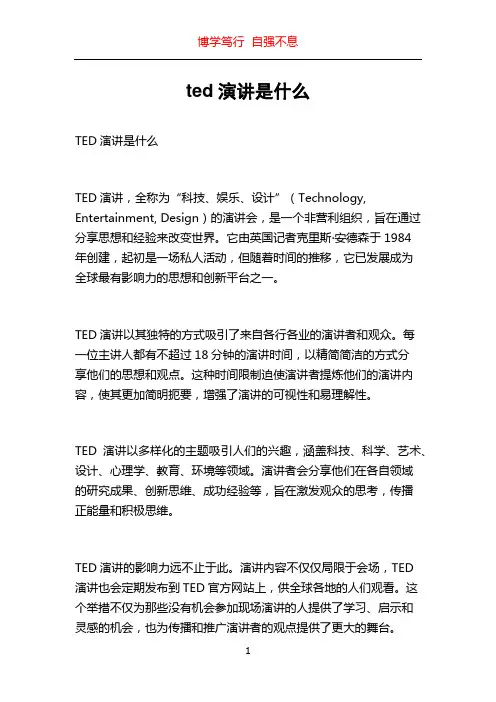
ted演讲是什么TED演讲是什么TED演讲,全称为“科技、娱乐、设计”(Technology, Entertainment, Design)的演讲会,是一个非营利组织,旨在通过分享思想和经验来改变世界。
它由英国记者克里斯·安德森于1984年创建,起初是一场私人活动,但随着时间的推移,它已发展成为全球最有影响力的思想和创新平台之一。
TED演讲以其独特的方式吸引了来自各行各业的演讲者和观众。
每一位主讲人都有不超过18分钟的演讲时间,以精简简洁的方式分享他们的思想和观点。
这种时间限制迫使演讲者提炼他们的演讲内容,使其更加简明扼要,增强了演讲的可视性和易理解性。
TED演讲以多样化的主题吸引人们的兴趣,涵盖科技、科学、艺术、设计、心理学、教育、环境等领域。
演讲者会分享他们在各自领域的研究成果、创新思维、成功经验等,旨在激发观众的思考,传播正能量和积极思维。
TED演讲的影响力远不止于此。
演讲内容不仅仅局限于会场,TED演讲也会定期发布到TED官方网站上,供全球各地的人们观看。
这个举措不仅为那些没有机会参加现场演讲的人提供了学习、启示和灵感的机会,也为传播和推广演讲者的观点提供了更大的舞台。
TED演讲的成功部分归功于它的独一无二的演讲风格。
与传统的冷冰冰的演讲不同,TED演讲更加活跃和富有互动性。
演讲者不仅仅是单纯的讲述者,他们通常会运用幽默、故事、幻灯片等多种形式来吸引观众的注意力。
这种风格既能让演讲更生动有趣,也使观众更容易接受和理解演讲内容。
另一个让TED演讲与众不同的方面是其注重多维度的思考和全球视野。
TED演讲聚集了来自世界各地的演讲者和观众,他们的思维和经验源自不同的文化、背景和行业。
这种多样性为每场演讲增添了新颖和独特的观点,拉近了世界各个角落的联系。
通过举办TED演讲,该组织为全球范围内的思想交流、创新和合作提供了平台。
它不仅通过精选演讲内容来激发人们的思维和创造力,还举办了一系列与会议相结合的活动,让演讲者和观众们有机会在演讲之外相互交流、分享和合作。
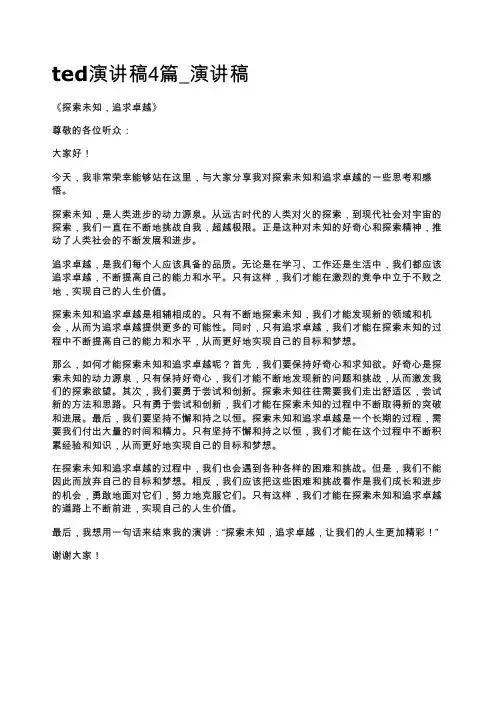
ted演讲稿4篇_演讲稿《探索未知,追求卓越》尊敬的各位听众:大家好!今天,我非常荣幸能够站在这里,与大家分享我对探索未知和追求卓越的一些思考和感悟。
探索未知,是人类进步的动力源泉。
从远古时代的人类对火的探索,到现代社会对宇宙的探索,我们一直在不断地挑战自我,超越极限。
正是这种对未知的好奇心和探索精神,推动了人类社会的不断发展和进步。
追求卓越,是我们每个人应该具备的品质。
无论是在学习、工作还是生活中,我们都应该追求卓越,不断提高自己的能力和水平。
只有这样,我们才能在激烈的竞争中立于不败之地,实现自己的人生价值。
探索未知和追求卓越是相辅相成的。
只有不断地探索未知,我们才能发现新的领域和机会,从而为追求卓越提供更多的可能性。
同时,只有追求卓越,我们才能在探索未知的过程中不断提高自己的能力和水平,从而更好地实现自己的目标和梦想。
那么,如何才能探索未知和追求卓越呢?首先,我们要保持好奇心和求知欲。
好奇心是探索未知的动力源泉,只有保持好奇心,我们才能不断地发现新的问题和挑战,从而激发我们的探索欲望。
其次,我们要勇于尝试和创新。
探索未知往往需要我们走出舒适区,尝试新的方法和思路。
只有勇于尝试和创新,我们才能在探索未知的过程中不断取得新的突破和进展。
最后,我们要坚持不懈和持之以恒。
探索未知和追求卓越是一个长期的过程,需要我们付出大量的时间和精力。
只有坚持不懈和持之以恒,我们才能在这个过程中不断积累经验和知识,从而更好地实现自己的目标和梦想。
在探索未知和追求卓越的过程中,我们也会遇到各种各样的困难和挑战。
但是,我们不能因此而放弃自己的目标和梦想。
相反,我们应该把这些困难和挑战看作是我们成长和进步的机会,勇敢地面对它们,努力地克服它们。
只有这样,我们才能在探索未知和追求卓越的道路上不断前进,实现自己的人生价值。
最后,我想用一句话来结束我的演讲:“探索未知,追求卓越,让我们的人生更加精彩!”谢谢大家!。
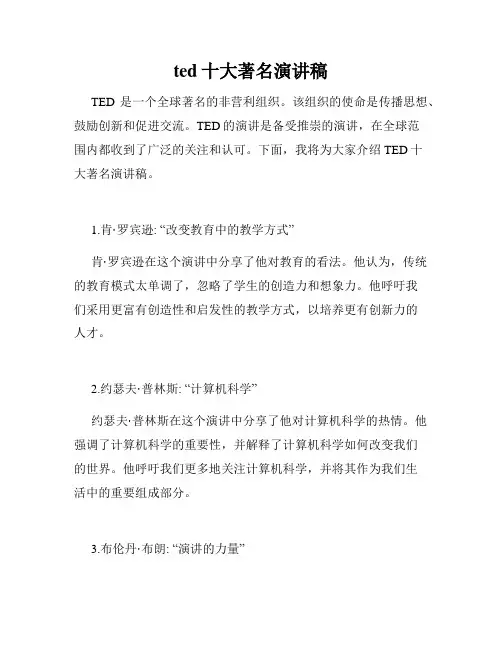
ted十大著名演讲稿TED是一个全球著名的非营利组织。
该组织的使命是传播思想、鼓励创新和促进交流。
TED的演讲是备受推崇的演讲,在全球范围内都收到了广泛的关注和认可。
下面,我将为大家介绍TED十大著名演讲稿。
1.肯·罗宾逊: “改变教育中的教学方式”肯·罗宾逊在这个演讲中分享了他对教育的看法。
他认为,传统的教育模式太单调了,忽略了学生的创造力和想象力。
他呼吁我们采用更富有创造性和启发性的教学方式,以培养更有创新力的人才。
2.约瑟夫·普林斯: “计算机科学”约瑟夫·普林斯在这个演讲中分享了他对计算机科学的热情。
他强调了计算机科学的重要性,并解释了计算机科学如何改变我们的世界。
他呼吁我们更多地关注计算机科学,并将其作为我们生活中的重要组成部分。
3.布伦丹·布朗: “演讲的力量”布伦丹·布朗在这个演讲中分享了他对演讲的看法。
他说,演讲可以改变世界,可以传递知识,可以启发思考。
他教授了一些关于演讲的技巧和原则,帮助听众更好地理解演讲的力量。
4.黛安娜·尤瑟: “领导艺术”黛安娜·尤瑟在这个演讲中分享了她对领导艺术的研究。
她解释了领导艺术对组织和个人的影响,并分享了一些培养领导力的技巧和方法。
5.丹尼尔·科恩曼: “了解人类”丹尼尔·科恩曼在这个演讲中分享了他对人类了解的研究。
他解释了人类思维的不足,以及如何加强我们的人类认知能力。
他通过提供正确的信息和知识来提高人类的理解力。
6.帕特里克·唐威利: “与云朵商量”帕特里克·唐威利在这个演讲中分享了他与云朵的对话。
他通过展示云朵和自然环境之间的相互作用来表达观点。
他通过与云朵的沟通,呼吁我们更加关注环境和自然。
7.夏洛特·哈钦斯: “肉类产业的真相”夏洛特·哈钦斯在这个演讲中分享了她对肉类产业的调查。
她揭示了肉类生产环节中的残酷和不人道。
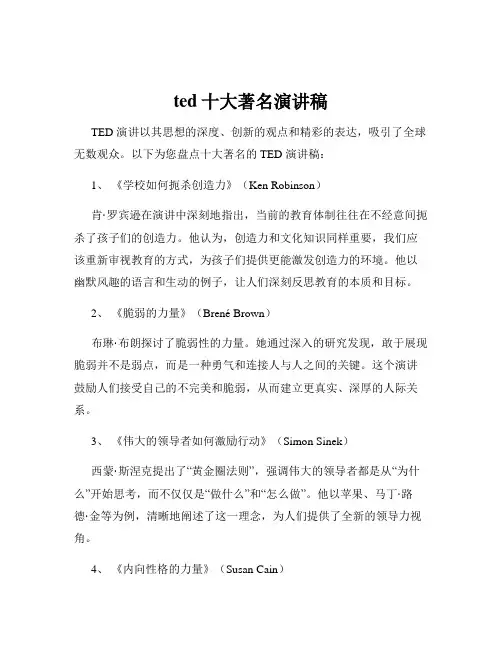
ted十大著名演讲稿TED 演讲以其思想的深度、创新的观点和精彩的表达,吸引了全球无数观众。
以下为您盘点十大著名的 TED 演讲稿:1、《学校如何扼杀创造力》(Ken Robinson)肯·罗宾逊在演讲中深刻地指出,当前的教育体制往往在不经意间扼杀了孩子们的创造力。
他认为,创造力和文化知识同样重要,我们应该重新审视教育的方式,为孩子们提供更能激发创造力的环境。
他以幽默风趣的语言和生动的例子,让人们深刻反思教育的本质和目标。
2、《脆弱的力量》(Brené Brown)布琳·布朗探讨了脆弱性的力量。
她通过深入的研究发现,敢于展现脆弱并不是弱点,而是一种勇气和连接人与人之间的关键。
这个演讲鼓励人们接受自己的不完美和脆弱,从而建立更真实、深厚的人际关系。
3、《伟大的领导者如何激励行动》(Simon Sinek)西蒙·斯涅克提出了“黄金圈法则”,强调伟大的领导者都是从“为什么”开始思考,而不仅仅是“做什么”和“怎么做”。
他以苹果、马丁·路德·金等为例,清晰地阐述了这一理念,为人们提供了全新的领导力视角。
4、《内向性格的力量》(Susan Cain)苏珊·凯恩为内向者发声,打破了社会对内向性格的偏见。
她指出,内向者拥有独特的优势,如深度思考、专注和善于倾听。
这个演讲让人们更加理解和尊重内向性格的人,也让内向者更加自信地发挥自己的特质。
5、《肢体语言塑造你自己》(Amy Cuddy)艾米·卡迪的研究表明,肢体语言不仅影响着别人对我们的看法,更能改变我们对自己的感觉和表现。
她分享了一些简单而有效的肢体语言技巧,帮助人们提升自信和影响力。
6、《我们为什么快乐?》(Dan Gilbert)丹·吉尔伯特探讨了人类追求快乐的本质。
他通过科学研究和有趣的故事,揭示了我们对快乐的误解以及如何真正获得长期的幸福感。
7、《你的不合理信念正在毁掉你》(Albert Ellis)阿尔伯特·埃利斯强调了不合理信念对我们情绪和行为的负面影响。
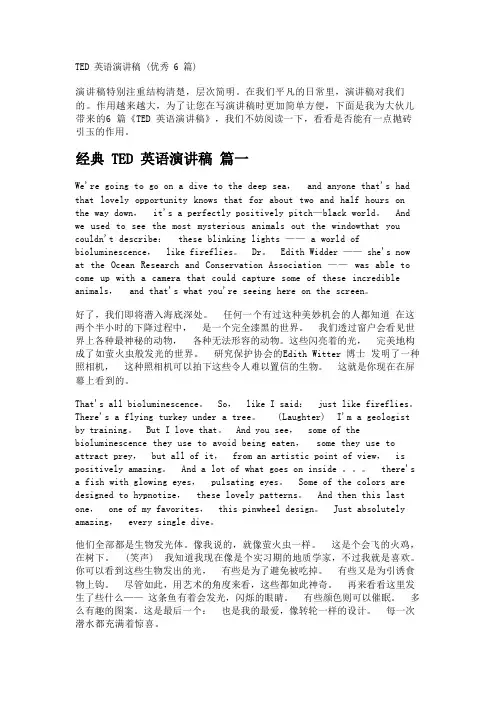
TED 英语演讲稿 (优秀 6 篇)演讲稿特别注重结构清楚,层次简明。
在我们平凡的日常里,演讲稿对我们的。
作用越来越大,为了让您在写演讲稿时更加简单方便,下面是我为大伙儿带来的6 篇《TED 英语演讲稿》,我们不妨阅读一下,看看是否能有一点抛砖引玉的作用。
We're going to go on a dive to the deep sea, and anyone that's had that lovely opportunity knows that for about two and half hours on the way down, it's a perfectly positively pitch—black world。
And we used to see the most mysterious animals out the windowthat you couldn't describe: these blinking lights —— a world of bioluminescence, like fireflies。
Dr。
Edith Widder —— she's now at the Ocean Research and Conservation Association ——was able to come up with a camera that could capture some of these incredible animals, and that's what you're seeing here on the screen。
好了,我们即将潜入海底深处。
任何一个有过这种美妙机会的人都知道在这两个半小时的下降过程中,是一个完全漆黑的世界。
我们透过窗户会看见世界上各种最神秘的动物,各种无法形容的动物。
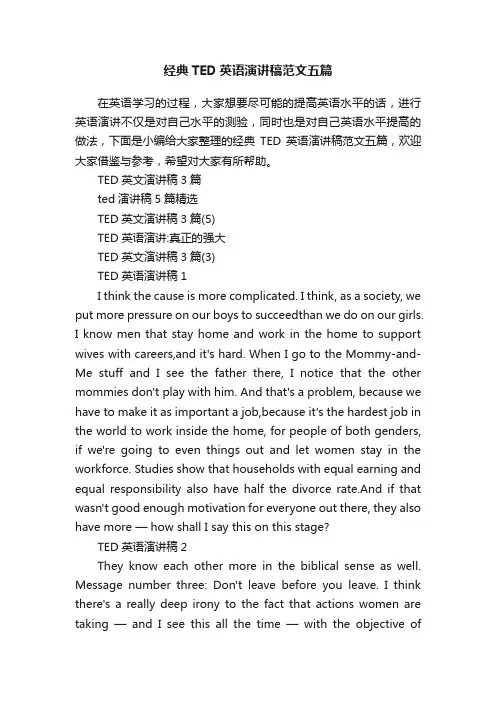
经典TED英语演讲稿范文五篇在英语学习的过程,大家想要尽可能的提高英语水平的话,进行英语演讲不仅是对自己水平的测验,同时也是对自己英语水平提高的做法,下面是小编给大家整理的经典TED英语演讲稿范文五篇,欢迎大家借鉴与参考,希望对大家有所帮助。
TED英文演讲稿3篇ted演讲稿5篇精选TED英文演讲稿3篇(5)TED英语演讲:真正的强大TED英文演讲稿3篇(3)TED英语演讲稿1I think the cause is more complicated. I think, as a society, we put more pressure on our boys to succeedthan we do on our girls.I know men that stay home and work in the home to support wives with careers,and it's hard. When I go to the Mommy-and-Me stuff and I see the father there, I notice that the other mommies don't play with him. And that's a problem, because we have to make it as important a job,because it's the hardest job in the world to work inside the home, for people of both genders, if we're going to even things out and let women stay in the workforce. Studies show that households with equal earning and equal responsibility also have half the divorce rate.And if that wasn't good enough motivation for everyone out there, they also have more — how shall I say this on this stage?TED英语演讲稿2They know each other more in the biblical sense as well. Message number three: Don't leave before you leave. I think there's a really deep irony to the fact that actions women are taking —and I see this all the time —with the objective ofstaying in the workforceactually lead to their eventually leaving. Here's what happens: We're all busy. Everyone's busy. A woman's busy. And she starts thinking about having a child, and from the moment she starts thinking about having a child, she starts thinking about making room for that child. "How am I going to fit this into everything else I'm doing?" And literally from that moment, she doesn't raise her hand anymore, she doesn't look for a promotion, she doesn't take on the new project, she doesn't say, "Me. I want to do that." She starts leaning back.TED英语演讲稿3The problem is that — let's say she got pregnant that day, that day — nine months of pregnancy, three months of maternity leave, six months to catch your breath — Fast-forward two years, more often — and as I've seen it — women start thinking about this way earlier — when they get engaged, or married, when they start thinking about having a child, which can take a long time. One woman came to see me about this. She looked a little young. And I said, "So are you and your husband thinking about having a baby?" And she said, "Oh no, I'm not married." She didn't even have a boyfriend.TED英语演讲稿4I said, "You're thinking about this just way too early." But the point is that what happens once you start kind of quietly leaning back? Everyone who's been through this — and I'm here to tell you, once you have a child at home, your job better be really good to go back, because it's hard to leave that kid at home. Your job needs to be challenging. It needs to be rewarding. You need to feel like you're making a difference. And if two years ago you didn't take a promotion and some guy next to you did, if three years ago you stopped looking for new opportunities,you'regoing to be bored because you should have kept your foot on the gas pedal. Don't leave before you leave. Stay in. Keep your foot on the gas pedal, until the very day you need to leave to take a break for a child — and then make your decisions. Don't make decisions too far in advance, particularly ones you're not even conscious you're making.TED英语演讲稿5My generation really, sadly, is not going to change the numbers at the top. They're just not moving. We are not going to get to where 50 percent of the population — in my generation, there will not be 50 percent of [women] at the top of any industry. But I'm hopeful that future generations can. I think a world where half of our countries and our companies were run by women, would be a better world. It's not just because people would know where the women's bathrooms are, even though that would be very helpful.I think it would be a better world. I have two children.I have a five-year-old son and a two-year-old daughter. I want my son to have a choice to contribute fully in the workforce or at home, and I want my daughter to have the choice to not just succeed, but to be liked for her accomplishments.。
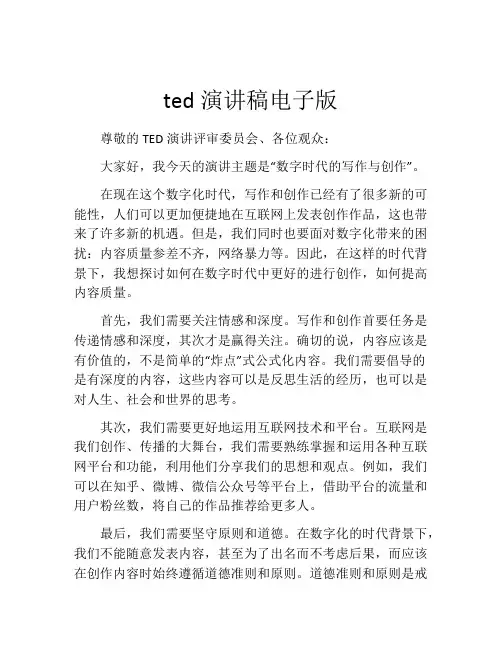
ted演讲稿电子版尊敬的TED演讲评审委员会、各位观众:大家好,我今天的演讲主题是“数字时代的写作与创作”。
在现在这个数字化时代,写作和创作已经有了很多新的可能性,人们可以更加便捷地在互联网上发表创作作品,这也带来了许多新的机遇。
但是,我们同时也要面对数字化带来的困扰:内容质量参差不齐,网络暴力等。
因此,在这样的时代背景下,我想探讨如何在数字时代中更好的进行创作,如何提高内容质量。
首先,我们需要关注情感和深度。
写作和创作首要任务是传递情感和深度,其次才是赢得关注。
确切的说,内容应该是有价值的,不是简单的“炸点”式公式化内容。
我们需要倡导的是有深度的内容,这些内容可以是反思生活的经历,也可以是对人生、社会和世界的思考。
其次,我们需要更好地运用互联网技术和平台。
互联网是我们创作、传播的大舞台,我们需要熟练掌握和运用各种互联网平台和功能,利用他们分享我们的思想和观点。
例如,我们可以在知乎、微博、微信公众号等平台上,借助平台的流量和用户粉丝数,将自己的作品推荐给更多人。
最后,我们需要坚守原则和道德。
在数字化的时代背景下,我们不能随意发表内容,甚至为了出名而不考虑后果,而应该在创作内容时始终遵循道德准则和原则。
道德准则和原则是戒律,是人性的底线。
这对于创作者和读者都是有益的:保障了内容质量,提高了文艺环境的健康程度,让读者从创作中获得更多的真正的价值。
综上所述,数字时代的写作与创作需要关注情感和深度;需要更好地运用互联网技术和平台;需要坚守原则和道德。
我相信,只有坚持这些原则,我们才能真正为数字时代的创作增添色彩,为读者打开文艺的新窗口。
谢谢!ted演讲稿电子版尊敬的各位观众:大家好!今天我要与大家分享的主题是“TED演讲稿电子版”。
随着科学技术的不断发展,电子化已成为一种趋势,TED演讲稿的电子化也是必然趋势。
这一主题不仅符合TED演讲对象及场合,更是现代科技时代的必修课。
首先,电子化是现代科技的趋势。
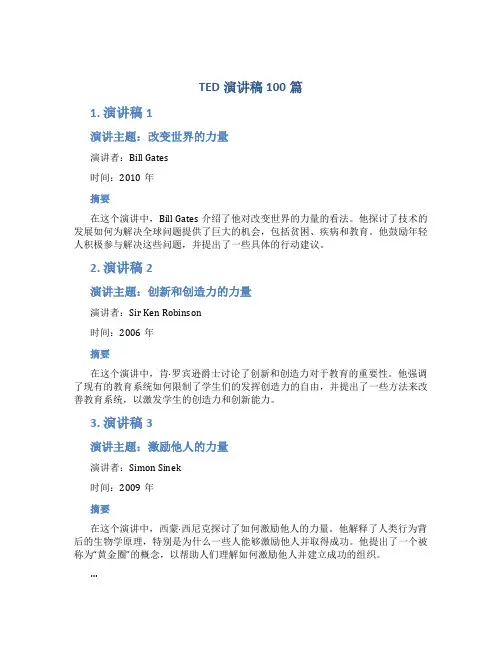
TED演讲稿100篇1. 演讲稿1演讲主题:改变世界的力量演讲者:Bill Gates时间:2010年摘要在这个演讲中,Bill Gates介绍了他对改变世界的力量的看法。
他探讨了技术的发展如何为解决全球问题提供了巨大的机会,包括贫困、疾病和教育。
他鼓励年轻人积极参与解决这些问题,并提出了一些具体的行动建议。
2. 演讲稿2演讲主题:创新和创造力的力量演讲者:Sir Ken Robinson时间:2006年摘要在这个演讲中,肯·罗宾逊爵士讨论了创新和创造力对于教育的重要性。
他强调了现有的教育系统如何限制了学生们的发挥创造力的自由,并提出了一些方法来改善教育系统,以激发学生的创造力和创新能力。
3. 演讲稿3演讲主题:激励他人的力量演讲者:Simon Sinek时间:2009年摘要在这个演讲中,西蒙·西尼克探讨了如何激励他人的力量。
他解释了人类行为背后的生物学原理,特别是为什么一些人能够激励他人并取得成功。
他提出了一个被称为“黄金圈”的概念,以帮助人们理解如何激励他人并建立成功的组织。
…100. 演讲稿100演讲主题:人工智能和未来的挑战演讲者:Elon Musk时间:2017年摘要在这个演讲中,埃隆·马斯克讨论了人工智能对于未来的挑战。
他强调了人工智能的发展可能会带来的潜在风险,包括失业和人类生存的威胁。
他呼吁政府和机构加大对人工智能的监管,并提出了一些确保人工智能安全的建议。
以上是TED演讲稿100篇的简短摘要,每篇演讲都涉及了不同的主题和观点,从改变世界的力量到人工智能的未来挑战。
这些演讲鼓舞人心,帮助我们更好地理解世界,并激发了我们对知识和创新的渴望。
无论你是学生、工作者还是教育者,这些演讲都值得一看。
通过思考这些演讲中的观点,我们可以更好地理解世界的复杂性,并积极参与解决全球的问题。
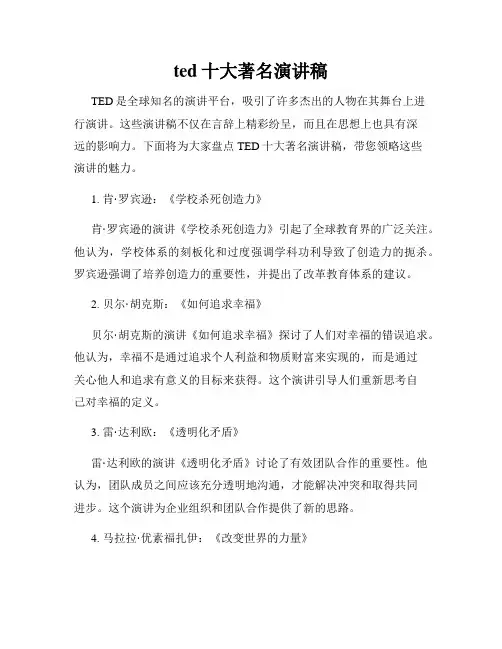
ted十大著名演讲稿TED是全球知名的演讲平台,吸引了许多杰出的人物在其舞台上进行演讲。
这些演讲稿不仅在言辞上精彩纷呈,而且在思想上也具有深远的影响力。
下面将为大家盘点TED十大著名演讲稿,带您领略这些演讲的魅力。
1. 肯·罗宾逊:《学校杀死创造力》肯·罗宾逊的演讲《学校杀死创造力》引起了全球教育界的广泛关注。
他认为,学校体系的刻板化和过度强调学科功利导致了创造力的扼杀。
罗宾逊强调了培养创造力的重要性,并提出了改革教育体系的建议。
2. 贝尔·胡克斯:《如何追求幸福》贝尔·胡克斯的演讲《如何追求幸福》探讨了人们对幸福的错误追求。
他认为,幸福不是通过追求个人利益和物质财富来实现的,而是通过关心他人和追求有意义的目标来获得。
这个演讲引导人们重新思考自己对幸福的定义。
3. 雷·达利欧:《透明化矛盾》雷·达利欧的演讲《透明化矛盾》讨论了有效团队合作的重要性。
他认为,团队成员之间应该充分透明地沟通,才能解决冲突和取得共同进步。
这个演讲为企业组织和团队合作提供了新的思路。
4. 马拉拉·优素福扎伊:《改变世界的力量》马拉拉·优素福扎伊是巴基斯坦的教育活动家,她的演讲《改变世界的力量》鼓励年轻人勇敢地追求自己的梦想。
她分享了自己争取女性教育权利的经历,并呼吁每个人都能为改变世界做出贡献。
5. 约翰·格林伍德:《为何我们不能拥有幸福的生活》约翰·格林伍德的演讲《为何我们不能拥有幸福的生活》探讨了现代生活中普遍存在的不幸感。
他认为,幸福感受的缺失与个体与社会之间的联系不足有关。
格林伍德呼吁人们重新审视生活方式,寻找真正的幸福感。
6. 丹尼·希尔:《如何开始某事重要的事情》丹尼·希尔的演讲《如何开始某事重要的事情》探讨了如何克服拖延症,并开始追求重要的事情。
他分享了自己在克服拖延症方面的经验和策略,并激励观众勇敢地踏出第一步。
ted演讲稿范文精彩6篇经典TED英语演讲稿篇一In 20xx — not so long ago — a professor who was then at Columbia University took that case and made it [Howard] Roizen. And he gave the case out, both of them, to two groups of students. He changed exactly one word: Heidi to Howard. But that one word made a really big difference. He then surveyed the students, and the good news was the students, both men and women, thought Heidi and Howard were equally competent, and that#39;s good.The bad news was that everyone liked Howard. He#39;s a great guy. You want to work for him. You want to spend the day fishing with him. But Heidi? Not so sure. She#39;s a little out for herself. She#39;s a little political.You#39;re not sure you#39;d want to work for her. This is the complication. We have to tell our daughters and our colleagues, we have to tell ourselves to believe we got the A, to reach for the promotion, to sit at the table, and we have to do it in a world where, for them, there are sacrifices they will make for that, even though for their brothers, there are not. The saddest thing about all of this is that it#39;s really hard to remember this. And I#39;m about to tell a story which is truly embarrassing for me, but I think important.TED英文演讲稿篇二in a funny, rapid-fire 4 minutes, aleis ohanian of reddit tells thereal-life fable of one humpback whale's rise to web stardom. the lesson ofmister splashy pants is a shoo-in classic for meme-makers and marketers in thefacebook age.这段有趣的4分钟演讲,来自reddit 网站创始人aleisohanian。
ted演讲稿大全中英简短TED演讲稿大全(中英)-简短1. 演讲题目:激发创造力中文演讲稿:大家好,我今天想谈谈创造力。
创造力是一种非常重要的能力,它可以帮助我们找到新的解决问题的方法,推动社会的发展。
但是,很多人在成长过程中逐渐失去了创造力,因为他们被规则束缚住了思维,只相信已经存在的答案。
我认为,我们应该积极培养和激发创造力。
首先,我们要保持好奇心,不停地提问和探索。
其次,我们要勇于尝试新事物,即使可能会失败也要勇敢地去尝试。
最后,我们要培养自信心,相信自己有能力创造出独特的东西。
希望大家能够意识到创造力的重要性,努力培养自己的创造力,以此推动社会的进步和发展。
英文演讲稿:Hello everyone, today I want to talk about creativity. Creativity isa very important ability that can help us find new ways to solve problems and drive social development. However, many people gradually lose their creativity as they grow up because they are constrained by rules and only believe in existing answers.I believe that we should actively cultivate and inspire creativity. First, we should maintain curiosity and constantly ask questionsand explore. Secondly, we should be brave enough to try new things, even if it may lead to failure. Finally, we should cultivate self-confidence and believe in our ability to create something unique.I hope that everyone can realize the importance of creativity and make efforts to cultivate their own creativity, thus promoting social progress and development.2. 演讲题目:人工智能的影响中文演讲稿:大家好,我今天想谈谈人工智能的影响。
ted演讲稿5篇精选TED它是美国的一家私有非盈利机构该机构以它组织的TED大会著称TED是以下三个英文单词的首字母大写Ttechnology技术、Eentertainment娱乐、Ddesign设计。
TED演讲的主旨是Ideas worth spreading,会请成功人士演讲。
一起来看看ted演讲稿5篇精选,欢迎查阅!ted演讲稿1chinese restaurants have played an important role in american history, as a matter of fact. the cuban missile crisis was resolved in a chinese restaurant called yenching palace in washington, d.c., which unfortunately is closed now, and about to be turned into walgreen's. and the house that john wilkes booth planned the assassination of abraham lincoln is actually also now a chinese restaurant called wok 'n roll, on h street in washington.事实上,中国餐馆在美国历史上发挥了很重要的作用。
古巴导弹危机是在华盛顿一家名叫“燕京馆”的中餐馆里解决的。
很不幸,这家餐馆现在关门了,即将被改建成沃尔格林连锁药店。
而约翰·威尔克斯·布斯刺杀林肯总统的那所房子现在也成了一家中餐馆,就是位于华盛顿的“锅和卷”。
and if you think about it, a lot of the foods that you think of or we think of or americans think of as chinese food are barely recognizable to chinese, for e_ample: beef with broccoli, egg rolls, general tso's chicken, fortune cookies, chop suey, the take-out bo_es.如果你仔细想想,就会发现很多你们所认为或我们所认为,或是美国人所认为的中国食物,中国人并不认识。
TED精选英语演讲稿演讲稿一:How to Be Your Best SelfIntroductionGood morning, ladies and gentlemen. I am honored to stand before you today and share with you some important insights on how to be your best self. In a world that is constantly changing and evolving, it is crucial that we strive to become the best version of ourselves.Body1. Embrace Self-AcceptanceThe first step towards becoming your best self is to embrace self-acceptance. We are all unique individuals with our own strengths and weaknesses. Instead of comparing ourselves to others, we should focus on accepting and loving ourselves for who we are. Embracing self-acceptance allows us to build a solid foundation of self-confidence and enables us to pursue our goals with passion and determination.2. Set Goals and Take ActionSetting goals is essential for personal growth. By setting goals, we give ourselves something to strive for and a sense of direction in life. However, setting goals alone is not enough. We must also take action towards achieving these goals. Taking action requires discipline, perseverance, and a willingness to step out of our comfort zones. It is through the pursuit of our goals that we truly become our best selves.3. Cultivate a Growth MindsetA growth mindset is the belief that our abilities and intelligence can be developed through hard work, dedication, and learning from failures. Cultivating a growth mindset allows us to view challenges as opportunities for growth rather than obstacles to overcome. By embracing a growth mindset, we become more resilient, adaptable, and open to new experiences. This mindset is essential for personal development and becoming our best selves.4. Practice Self-CareIn our fast-paced and demanding lives, it is easy to neglect our own well-being. However, self-care is vital for our overall happiness and success. Engaging in activities that promote physical, mental, and emotional well-being allows us to recharge, reduce stress, and increase our productivity. Whether it is through exercise, meditation, spending time with loved ones, or pursuing a hobby, self-care should be prioritized in order to become our best selves.ConclusionIn conclusion, becoming your best self is a lifelong journey that requires self-acceptance, goal-setting, action-taking, cultivating a growth mindset, and practicing self-care. By embracing these principles and consistently working towards personal growth, we can unlock our full potential and lead fulfilling lives. Remember, the road to becoming your best self may not always be easy, but it is definitely worth the effort. Thank you.演讲稿二:The Power of PositivityIntroductionGood afternoon, everyone. Today, I want to talk to you about the power of positivity. In a world that is often filled with negativity and pessimism, it is important to understand the impact that positivity can have on our lives.Body1. The Benefits of PositivityPositive thinking has been linked to numerous benefits, both for our mental and physical well-being. Studies have shown that optimistic individuals tend to have lower levels of stress, improved immune function, and increased resilience in the face of adversity. Furthermore, positivity can enhance our relationships, boost our creativity, and improve our overall quality of life.2. Cultivating a Positive MindsetCultivating a positive mindset requires conscious effort and practice. One way to do this is by reframing negative thoughts and focusing on the positive aspects of a situation. For example, instead of dwelling on a failure, we can view it as a learning opportunity and a stepping stone towards success. Additionally, surrounding ourselves with positive influences, such as supportive friends and uplifting media, can also contribute to a more positive outlook on life.3. The Power of GratitudeGratitude is another powerful tool for cultivating positivity. Taking the time to appreciate the things we have and express gratitude for the people in our lives can help shift our focus from what is lacking to what is abundant. Gratitude not only enhances our well-being but also strengthens our relationships and fosters a sense of contentment and fulfillment.4. Spreading PositivitySharing positivity with others is a beautiful way to make a difference in the world. Acts of kindness, encouragement, and genuine compliments can brighten someone’s day and create a ripple effect of positivity. By spreading positivity, we not only uplift others but also contribute to a more harmonious and compassionate society.ConclusionIn conclusion, positivity has the power to transform our lives. By cultivating a positive mindset, practicing gratitude, and spreading positivity to others, we can experience the many benefits that come with embracing positivity. Let us be the change we wish to see in the world and make a conscious effort to choose positivity in every aspect of our lives. Thank you.。
ted十大著名演讲稿TED(Technology, Entertainment, Design)是一个非营利性组织,旨在传播思想、鼓励创新和分享知识。
这个组织定期举办TED会议,邀请各领域的专家、学者、企业家等演讲者分享他们的观点和见解。
TED演讲以其深刻的思想、生动的语言和精彩的表达而闻名,既丰富了听众的知识,也激发了他们对世界的思考。
以下是TED十大著名演讲稿,这些演讲以不同的方式启发和鼓励着人们。
1. "Do Schools Kill Creativity?" by Sir Ken Robinson英国教育家肯·罗宾逊发表的这篇演讲探讨了现代教育体系对创造力的抑制。
他认为,学校过度注重学科知识和标准化测试,忽视了创造力和想象力的培养。
罗宾逊呼吁改革教育,让学生发挥他们独特的才能和创造力。
2. "The Power of Vulnerability" by Brené Brown研究社会科学的布伦·布朗通过这篇演讲深入探讨了脆弱性的力量。
她分享了她在研究中的发现,认为脆弱性是我们建立人际连接、实现自我成长的关键。
布朗鼓励我们勇敢地面对自己的脆弱,并实现真正的人生和关系。
3. "How Great Leaders Inspire Action" by Simon Sinek西蒙·西内克在这篇演讲中研究了伟大领导者的共同特点,并归纳出一个重要原则:“为什么比什么更重要”。
他指出了许多伟大领导者如何通过传达他们对事业的动机和目标来激励行动,并鼓励我们找到属于自己的“为什么”。
4. "The Puzzle of Motivation" by Dan Pink丹·平克在这篇演讲中提出了一个具有启示性的问题:金钱是否是唯一的激励因素?他介绍了科学研究的结果,指出在创造性工作和复杂任务中,金钱奖励反而可能降低动机。
TED英文演讲稿3篇TED,是美国的一家私有非盈利机构,该机构以它组织的TED大会著称,而TED演讲集涉及范围广泛,主要有科技、娱乐、设计、商业以及科学。
TED英文有哪些?小编为大家整理了TED英文演讲稿3篇,欢迎大家阅读。
TED英文演讲稿篇1What fear can teach us恐惧可以教会我们什么One day in 1819, 3,000 miles off the coast of Chile, in one of the most remote regions of the Pacific Ocean, 20 American sailors watched their ship flood with seawater.1820xx年的某一天,在距离智利海岸3000英里的地方,有一个太平洋上的最偏远的水域, 20名美国船员目睹了他们的船只进水的场面。
They'd been struck by a sperm whale, which had ripped a catastrophic hole in the ship's hull. As their ship began to sink beneath the swells, the men huddled together in three small whaleboats.他们和一头抹香鲸相撞,给船体撞了一个毁灭性的大洞。
当船在巨浪中开始沉没时,人们在三条救生小艇中抱作一团。
These men were 10,000 miles from home, more than 1,000 miles from the nearest scrap of land. In their small boats, they carried only rudimentary navigational equipment and limited supplies of food and water.这些人在离家10000万英里的地方,离最近的陆地也超过1000英里。
Martin Jacques: Understanding the rise of ChinaThe world is changing with really remarkable speed. If you look at the chart at the top here, you’ll see that in 2025 these Goldman Sachs projections suggest that the Chinese economy will be almost the same size as the American economy. And if you look at the chart for 2050, it’s projected that the Chinese economy will be twice the size of the American economy, and the Indian economy will be almost the same size as the American economy. We should bear in mind here these projections were drawn up before the Western financial crises.A couple of weeks ago, I was looking at the latest projection by BNP (Banque Nationale de Paris) PARIBAS for when China will have a larger economy than the United States. Goldman Sachs projected 2027. The post-crisis projection is 2010. That’s just a decade way.China is going to change the world in two fundamental respects. First of all, it's a huge developing country with a population of 1.3 billion people, which has been growing for over 30 years at around 10% a year. And within a decade it will have the largest economy in the world. Never before in the modern era has the largest economy in the world been that of a developing country, rather than a developed country.Secondly, for the first time in the modern era, the dominant country in the world which I think is China will become, will be not from the West, and from very very different civilizational roots.Now I know it’s a widespread assumption in the West that as countries modernize, they also Westernize. This is an illusion. It’s an assumption that modernity is a product simply of competition markets and technology. It is not; it is also shaped equally by history and culture. China is not like the West, and it will not become like the West. It will remain in very fundamental respects very different. Now the big question here is obviously, how do we make sense of China? How do we try to understand what China is? And the problem we have in the West at the moment by-and-large is that the conventional approach is that we understand it really in Western terms, using Western ideas. We can’t. Now I want to offer you 3 building blocks for trying to understand what China is like just as a beginning.The first is this, that China is not really a nation state. Okay, it's called itself a nation state for the last hundred years. But everyone who knows anything about China knows it’s a lot older than this. This was what China looked with the victory of the Qin Dynasty in 221 B.C. at the end of warring state period—the birth of modern China. And you can see it against the boundaries of modern China. Or immediately afterward, the Han Dynasty, still 2000 years ago, and you can see already it occupies most of what we now know as Eastern China which is where the vast majority of Chinese lived then and live now.Now what is extraordinary about this is what gives China it’s sense of being China, what gives the Chinese the sense of what it is to be Chinese, comes not from the last hundred years, not from the nation state period which is what happened in the West, but from the period, if you like, of the civilization state. I’m thinking here, for example, of customs like ancestral worship, of a very distinctive notion of the state, likewise, a very distinctive notion of the family, social relationshipslike “guanxi”, Confucian values and so on. These are all things that come from the period of the civilization state.In other words, China, unlike the Western states and most countries in the world, is shaped by its sense of civilization, its existence as a civilization state, rather than as a nation state.And there’s one other thing to add to this, and that is this. Of course we know China’s big, huge demographically and geographically, with a populat ion of 1.3 billion people. What we often aren’t really aware of is the fact that China is extremely diverse and very pluralistic, and in many ways very decentralized. You can’t run a place on this scale simply from Beijing, even though we think this to be the case. It’s never been the case.So this is China, a civilization state, rather than a nation state. And what does it mean? Well, I think it has all sorts of profound implications. I'll give you two quick ones.The first is that the most important political value for the Chinese is unity, is the maintenance of Chinese civilization. You know, 2000 years ago, Europe breakdown, the fragmentation of the Holy Roman Empire, it divided, and its remained divided ever since. China, over the same time period, went in exactly the opposite direction, very painfully holding this huge civilization, civilization state together.The second is, maybe more prosaic, which is Hong Kong. Do you remember the handover of Hong Kong by Britain to China in 1997? You may remember what the Chinese constitutional proposition was, one country, two systems. And I’ll lay a wager that barely anyone in the West believed them. Window dressing. When China gets its hands on Hong Knong, that won’t be the case.13 years on, the political and legal system in Hong Kong is as different now as it was in 1997. We were wrong. Why were we wrong? We were wrong because we though, naturally enough in nation state ways.Think of German unification, 1990. What happened? Well, basically the East was swallowed by the West. One nation, one system—that is the nation state mentality. But you can’t run a country like China, a civilization state on the basis of one civilization, one system. It doesn't work. So actually the response of China to the question of Hong Kong—as it will be to the question of Taiwan—was a natural response: one civilization, many systems.Let me offer you another building block to try to understand China, maybe it’s not such a comfortable one. The Chinese have a very very different conception of race to most other countries. Do you know of the 1.3 billion Chinese, over 90% of them think they belong to the same race, the Han. Now this is completely different from the other world’s most populous countries. India, the United States, Indonesia, Brazil—all of them are multiracial. The Chinese don’t feel like that. China is only multiracial really at the margins. So the question is, why? Well, the reason I think essentially is again back to the civilization state. Very very…you know, at least 2000 years, a history of conquest, absorption, assimilation and so on, led to the process by which over time this notion of the Han emerged, of course, nurtured by a growing and very powerful sense of cultural identity.Now the great advantage of this historical experience has been that, without the Han, China could never have held together. The Han identity has been the cement which has held this countrytogether. The great disadvantage of it is that the Han have a very weak conception of cultural differences. They really believe in their own superiority, and they are disrespectful of those who are not. Hence their attitude, for example, to the Uyghurs and to the Tibetans.Or let me give you my third building block, the Chinese state. Now the relationship between the state and society in China is very different from that in the West. Now we in the West are overwhelmingly seem to think—in these days at least—that the authority and legitimacy of the state is a function of democracy. The problem of this proposition is that the Chinese state enjoys more legitimacy and more authority amongst the Chinese that is true with any Western state. And the reason for this is because—well, there’re two reasons I think. And it’s obviously got nothing to do with democracy, bec ause in our terms the Chinese certainly don’t have a democracy.And the reason for this is, firstly, because the state in China is given a very special. It enjoys a very special significance as the representative, the embodiment and the guardian of Chinese civilization, of the civilization state. This is as close as China gets to a kind of spiritual role.And the second reason is because, whereas in Europe and North America, the state’s power is continuously challenged—I mean in the European tradition, historically against the church, against other sectors of the aristocracy, against merchants and so on. For 1000 years, the power of the Chinese state has not been challenged. It’s had no serious rivals. So you can see, the way in which power has been constructed in China is very different from our experience in Western history.The result, by the way, is that the Chinese have a very different view of the state. Whereas we tend to view it as an intruder, a stranger, certainly an organ whose powers need to be limited or defined and constrained, the Chinese don’t see the state like that at all. The Chinese view the state as an intimate—not just as an intimate actually, as a member of the family; not just in fact as a member of the family, but as the head of the family, the patriarch of the family. This the Chinese view of the state, very very different to us. It’s embedded in society in a different kind of way to what the case in the West.And I would suggest you that actually what we are dealing with here, in the Chinese context, is a new kind of paradigm, which is different from anything we’ve had to think about in the past. You know that China believes in the state and market, I mean, Adam Smith already writing in the late 18th century, said, “the Chinese mar ket is larger and more developed and more sophisticated than anything in Europe.” And, apart from the Mao period, that remained more-or-less the case ever since. But this is combined with an extremely strong and ubiquitous state. The state is everywhere in China.I mean, its leading firms, many of them are still publicly owned. Private firms, however large they are, like Lenovo, depend in many ways on the state patronage. Targets for the economy and so on are set by the state. And the state, of course, its authority flows into lot of other areas as we are familiar with, with something like the one-child policy.Moreover, this is a very old state tradition, a very old tradition of statecraft. I mean, if you want an illustration of this, the Great Wall is one. But this is another, this is the Grand Canal, which was constructed in the first instance in the 5th century B.C. and was finally completed in the 7th century A.D. It went for 1114 miles, linking Beijing with Hangzhou and Shanghai. So there’s a long histo ryof extraordinary state infrastructure projects in China, which I suppose helps us to explain what we see today, which is something like the Three Gorges Dam and many other expressions of state competence within China.So there we have 3 building blocks for trying to understand the difference that is China—the civilization state, the notion of race and the nature of the state and its relationship to society.And yet we still insist, by-and-large, in thinking that we can understand China by simply drawing on Western experience, looking at it through Western eyes, using Western concepts. If you want to know why we unerringly to get China wrong, our predictions about what’s going to happen to China are incorrect, this is the reason. Unfortunately I think, I have to say that I think attitude towards China is that of a kind of little Westerner mentality. There’s kind of arrogant. It’s arrogant in the sense that we think that we are best, and therefore we have the universal measure.And secondly, it’s ignorant.We refuse to really address the issue of difference. You know, there’s a very interesting passage in a book by Paul Cohen, the American historian. And Paul Cohen argues that the West thinks of itself as probably the most cosmopolitan of all cultures. But it’s not. In many ways, it’s the most parochial, because for 200 years, the West has been so dominant in the world that it’s not really needed to understand other cultures, other civilizations. Because at the end of the day, it could, if necessary by force, get its own way. Whereas those cultures, virtually the rest of the world in fact, which have been in a far weaker position, vis-à-vis the West, have been thereby forced to understand the West, because the West’s presence in those societies. And, they are, as a result, more cosmopolitan in many ways than the West.I mean take the question of East Asia: Japan, Korea, China, etc. a third of the world’s population lives there, now the largest economic region in the world. And I’ll tell you now, that East Asia ners, people from East Asia, are far more knowledgeable about the West than the West is about East Asian.Now this point is very germane, I’m afraid, to the present. Because what’s happening? Back to that chart at the beginning the Goldman Sachs chart. What is happening is that, very rapidly in historical terms, the world is being driven and shaped, not by the old developed countries, but by the developing world. I mean we’ve seen this in terms of the G20 usurping very rapidly the position of the G7 or the G8. And there are 2 consequences of this, first, the West is rapidly losing its influence in the world. There was a dramatic illustration of this actually, a year ago, Copenhagen, climate change conference, Europe was not at the final negotiating table. When did that last happen? I would wager it was probably about 200 years ago, and that is what is going to happen in the future.And the second implication is that the world will inevitably as a consequence, become increasingly unfamiliar to us, because it’ll be shaped by cultures and experiences and histories that we are not really familiar with or conversant with. And at last, I’m afraid, take Europe, America is slightly different, but Europeans by and large I have to say are ignorant, are unaware about the way the world is changing. Some people, I’ve got an English friend in China, he said “the continent is sleepwalking into oblivion.” Well maybe that’s true, maybe that’s an exaggeration. But there’s another problem which goes along with this that Europe is increasing out of touch with the world and that is a sort of a loss of a sense of the future. I mean, Europe once, of course, once commanded thefuture in its confidence. Take the 19th century for example, but this, alas, is no longer true.If you want to feel the future, if you want to taste the future, try China—there’s old Confucius. This is a railway station the like of which you’ve never seen before. It doesn’t even look like a railway station. This is the new Guangzhou railway station for the high-speed trains. China already has more of the bigger network than any other country in the world and will soon have more than all the rest of the world put together. Or take this: now this is an idea, but it’s an idea to be tried out shortly in a suburb of Beijing. Here you have a megbus, on the upper deck carries about 2000 people. It travels on rails down a suburban road, and the cars travel underneath it. And it does speeds of up to about 100 miles an hour。